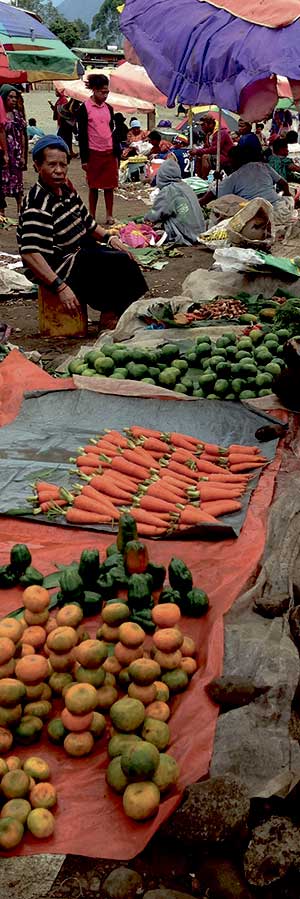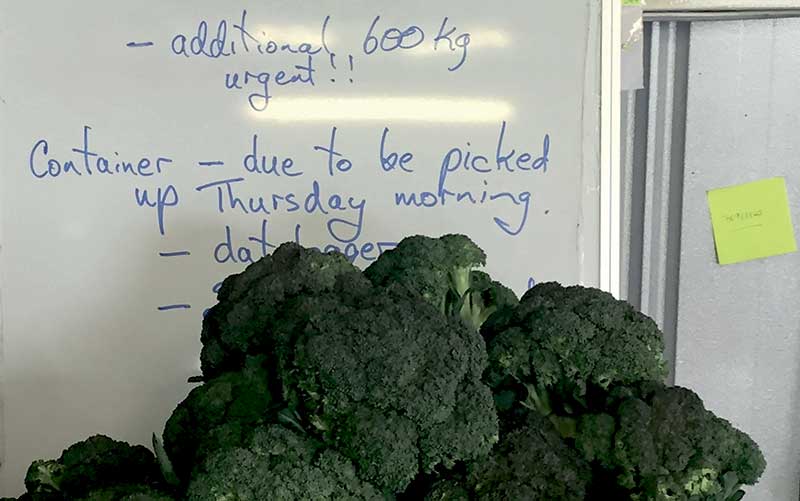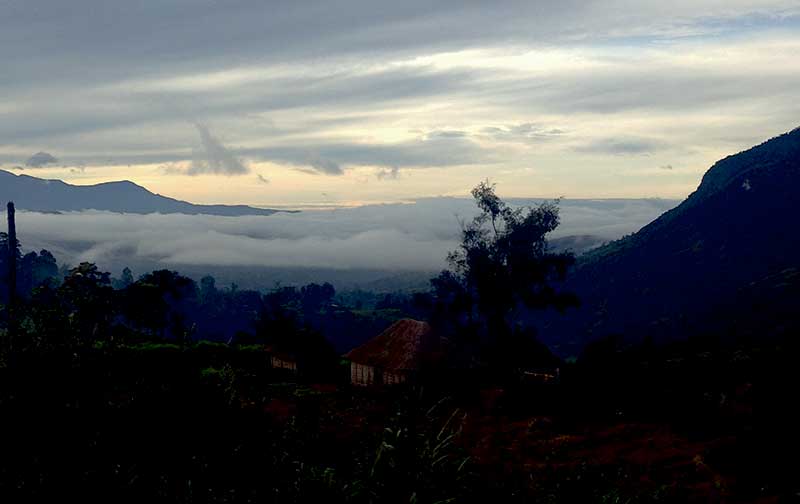INTRODUCTION
Heavy heads of lettuce bursting with freshness are increasingly available in the supermarkets of Papua New Guinea’s capital Port Moresby, but are not particularly remarkable to most people who purchase them. Sure, the lettuce is fresh, crunchy and even flavoursome as far as lettuce goes but who would guess that their very presence on Port Moresby’s supermarket shelves means that the income of women farmers more than 500 km away in Mount Hagen has increased substantially and that their children have better access to food and are even able to attend school as a result. Such are the consequences of a fresh produce (i.e. fruits and vegetables) supply chain development partnership between the New Zealand Agency for International Development (NZAID), the World Bank’s International Finance Corporation (IFC), and Tininga, a Mount Hagen retailer and fresh produce wholesaler.
What is additionally remarkable about the Mount Hagen lettuce being bought in Port Moresby supermarkets is the number and nature of logistical challenges that have been overcome in the lettuce’s transport. Despite these challenges, the quantities of lettuce and other fresh produce making its way to Port Moresby continue to increase. Tininga was selling 14,000 kg of fresh produce in early 2015 but more than quadrupled this amount a year later when 57,000 kg were sold after partnering with NZAID and IFC. Sales volume further increased by 15 percent in the first quarter of 2016, with 66,000 kg of fresh produce sold in March.
IMPROVING WOMEN’S LIVES

In 2015 things changed for the better for some of the women farmers of Mount Hagen when Tininga, a local company best known for its supermarkets and hardware store, expanded its wholesale operation in accordance with its new fresh produce supply chain partnership with NZAID and IFC. Tininga commenced to buy more produce from local farmers sometimes at better rates than those normally available at local markets in order to service a contract with the Port Moresby supermarkets of PNG’s largest retail operation, City Pharmacy LTD. Not only is Tininga paying a fair market price to local farmers, more importantly it offers a steady, year-round market without the extreme price fluctuations often experienced locally.
Women farmers like Michelle Taros and Maria Joe grow a variety of produce in their Mount Hagen gardens but they generate most of their income through the sale of lettuce. In late 2015 and early 2016, Michelle and Maria started selling the best of their lettuce to Tininga, a very selective buyer that must meet its Port Moresby customers’ strict quality standards, but are still able to sell their ‘second grade’ lettuce at the local market. Thus, for the first time, these women find themselves with access to two markets with a novel opportunity to improve quality as well as selling increasing quantities to Tininga in order to reach the more lucrative and discerning market in Port Moresby.
The substantial increase in income for these women is life changing. Michelle has three sons aged seven, eight and ten. The money she raised from her first lettuce sales to Tininga allowed her to pay for her children’s school fees and school supplies. Future sales will enable her to make contributions to her community such as helping other families with funeral expenses. The capacity to make such contributions is culturally very significant and can improve Michelle’s status in her community. Michelle is contemplating the possibility of building a stronger, more permanent house (i.e. with wooden walls and roofing iron), replacing her village house made of locally sourced bush materials.
Like Michelle, recently widowed Maria also has children to support – three boys and three girls aged five to sixteen. Maria, too, is dreaming of a brighter future that includes being able to save some of her earnings for the benefit of her children. In the short term she wants to renovate her house in order to rent it out. Her long term aspirations are to build proper houses for each of her children and to open bank accounts to enable her to deposit savings for their futures.
A WORK IN PROGRESS
The women farmers of Mount Hagen are able to realise the described opportunities by providing Tininga with high quality produce in the right volumes at the right times. This requires considerable efforts in capacity building. The Tininga project was developed with this in mind, incorporating activities such as (a) support for organising farmer groups, (b) deployment of extension training, (c) improved access to inputs, as well as (d) improved access to information.
The project is still very much a work in progress with capacity building activities not completed yet. Many farmers are still struggling to get their produce quickly to the depot without physical damage. Indeed, the single most important risk in the fresh produce supply chain is between the farmers and Tininga where goods are often improperly packed and stored in hot environments. However, there are many more risks between the depot, where farmers sell their fruit and vegetables, and the supermarkets in Port Moresby.
There are no trains in PNG and there is no road connecting the town of Mount Hagen to the nation’s capital with the largest market for fresh produce. Instead fruits and vegetables must travel a circuitous, lengthy and often dangerous route. Firstly, 12 hours and 472 km on the notoriously rough and poorly maintained Highlands Highway, which descends from an altitude of 1,750m in Mount Hagen to sea level at the port city of Lae. From Lae, located on the Eastern shores of the country, fresh produce is then loaded on to ships and transported 1,431 km in three days before reaching Port Moresby’s wharves on the Southern shores. Although fruit and vegetables are air-freighted in PNG, the cost of this transport route is notoriously expensive.
WHAT CAN GO WRONG AND WHERE
Temperature control is the single most important factor in ensuring that the quality and shelf-life of the fresh produce bought by Tininga is maintained throughout its long and difficult journey to the supermarkets in Port Moresby. When farmers deliver their harvest to the Tininga depot, a weight, quality and temperature check is exercised by the well trained Tininga staff. Farmers are paid, while the fresh produce is immediately cooled down to storage temperatures. Once cooled, fruit and vegetables are packed into purpose-built boxes, which are carefully selected based on their temperature control and air circulation properties. After packaging and labelling, the produce is stored in a temperature controlled chiller awaiting transport.
Delicate fresh produce such as Michelle and Maria’s lettuce faces further risks on its journey. While the transit points are particularly problematic in terms of delays because the cooling containers do not have access to power at this point and therefore temperature control cannot be guaranteed, additional factors threaten quality during road transport and actual shipment. Without dedicated refrigerated trucks, generators are required to keep the containers at the right temperature. However, these generators do not work well on an excessively rough twelve-hour road journey from Mount Hagen to Lae as the electrical connections can fail and drivers must stop on a regular basis to manually turn the generators off or on. Internal temperature data logging devices installed in the containers indicate when the drivers do not check the functionality of the generators regularly. Furthermore, poor airflow around the produce in the shipping containers whilst at sea has created ‘hot spots’ in certain sections of the containers.
Miraculously, much produce survives. And, if cooling has been effective and consistent, it stays fresh and appealing for some time on grocery store shelves. The condition of the produce on arrival in Port Moresby is carefully assessed and feedback is provided to the Mt Hagen depot, along with the data from the temperature logging devices. This valuable information is analysed by Tininga staff and advisors to identify and address problems in the supply chain.
CONCLUSION
Tininga’s development of a high quality fresh produce supply chain through its partnership with NZAID and IFC already improves the lives of some of the most disadvantaged women in PNG. Tininga achieves this by systematically overcoming numerous and substantial logistical challenges while steadily increasing the sale volumes of fresh produce. More high quality produce arriving in Port Moresby equates to more money in the hands of women farmers in Mount Hagen.
Although some farmers, like Michelle and Maria, have seen a short term jump in income merely through being given access to the Port Moresby market, sustained improvements to their income and therefore their lives are yet to be realised. Better organization of farmer groups, more extension training with access to improved seeds and tools to reduce pests and diseases will further contribute to the capacity of women farmers to increase the quality and quantity of fresh produce they are able to sell to Tininga. This is a reciprocal and mutually beneficial business relationship. Without farmers like Michelle and Maria there would be no produce for Tininga to sell at a profit to the supermarkets in Port Moresby or the other potential markets which the company has begun to access (e.g. supplying mining camps). Business expansion will inevitably mean that Tininga can purchase more produce from the women farmers in Mount Hagen and that they in turn will continue to benefit from not only greater but very importantly more predictable and sustainable incomes.


